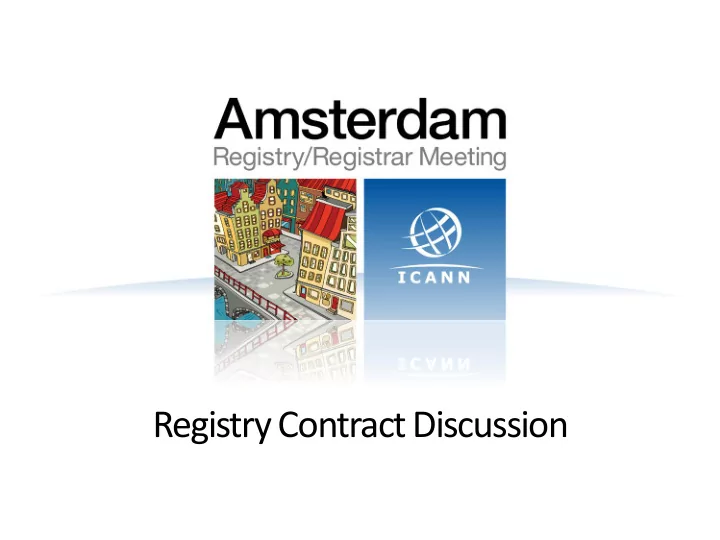

Registry Contract Discussion
Panellists Dr Liz Williams, Sedari Volker Greiman, Key Systems Dr Tobias Mahler, University of Oslo Law School In collaboration with David Carrington, ARI 2
Overview • “One size fits all” doesn’t fit • Draw means applicants penalised for negotiating – never envisaged during previous consultation • Many elements of draft contract are still [ come back later] • Certain clauses will cause issues for every applicant - Jurisdiction/Arbitration/Liability/Indemnity • WHOIS requirements may conflict with data protection laws • RAA, TMCH, URS, EBERO – acronym limitations • IDN applicants now prioritised so issues are urgent 3
Key questions • Is the current draft reasonable, particularly in light of the global mandate of ICANN? • What are the legal and contractual risks and how can they be managed? 4
Fairness • Jurisdiction • National law • Late entry is disadvantage 5
Click to add caption 6
Legal risks Establishing the context Communication and consultation Risk assessment Monitoring and review Risk identification Risk analysis Risk evaluation Risk treatment ISO 31000:2009 7
Legal risks The legal and factual context • Liability Legal risk assessment Identification of risks , • Indemnity particularly legal risks Risk analysis: • Conflict with applicable law legal & factual uncertainty • Personal data Risk evaluation: quantitative & qualitative Risk treatment : legal & factual risk controls 8
Key issues I • Liability (5.2 & 5.3) unlimited punitive and exemplary damages ordered by an arbitrator • Indemnity (7.1 (a)) Registry Operator to indemnify and defend ICANN For IOGs: only best efforts • Jurisdiction (5.2) Los Angeles For IGOs: Geneva or mutually agreed location 9
Key Issues II • Warranty: no violation of law Registry Operator warrants that no ICANN Requirement conflicts with or violates any Applicable Law ICANN requirement: very broad • Personal data Compliance with data protection laws 10
Next steps • Open conversation here & at other ICANN meetings • Work within the NTAG • Multi-party white paper? • Recognition of immediacy for some applicants, particularly IDNs • Timeframe for submission of “agreed” general text appropriate for all applicants • Expectations of bi-lateral negotiations which slow delegation 11
Contacts: Dr Liz Williams liz.williams@sedari.com
Recommend
More recommend